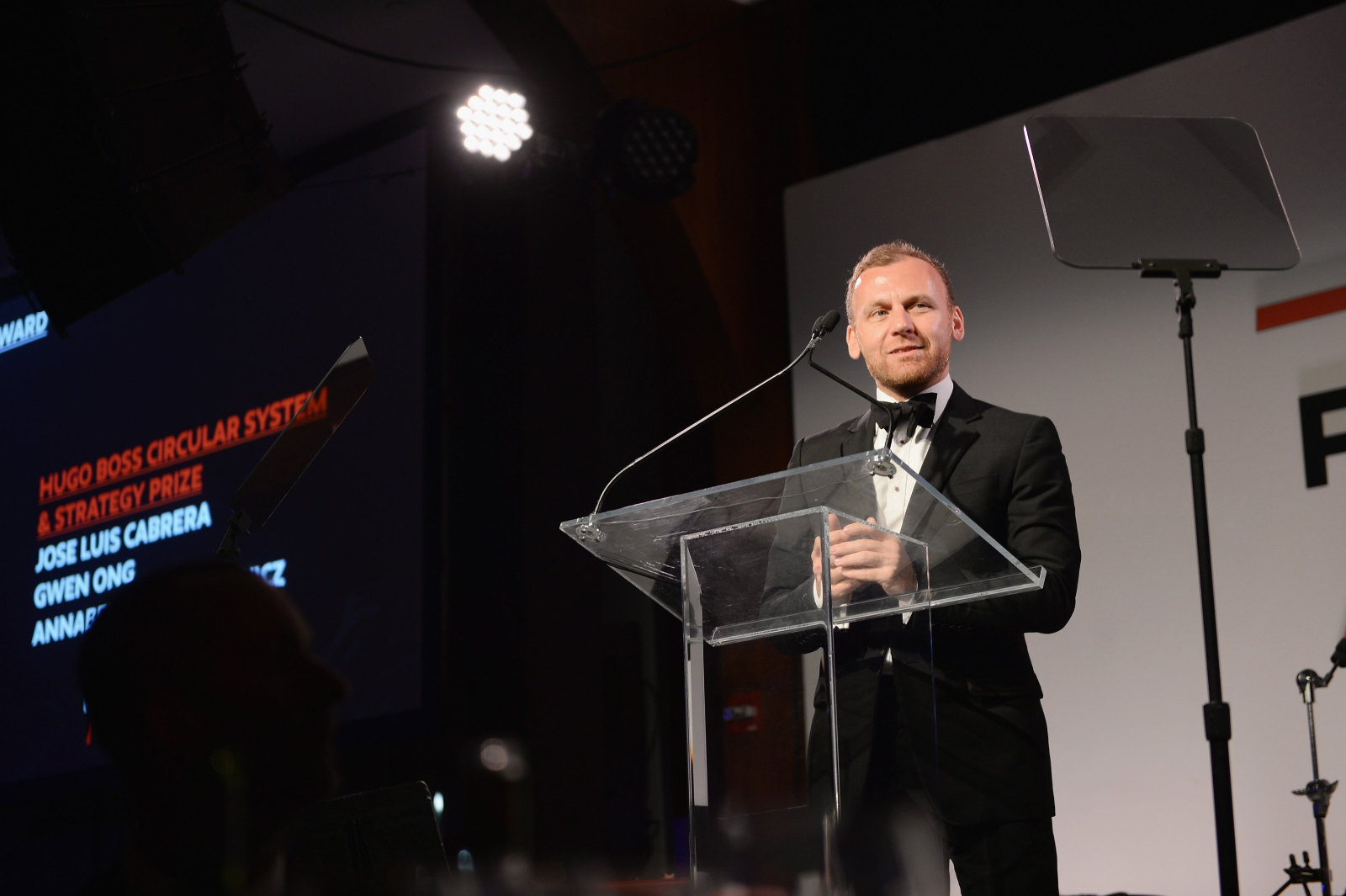
FASHION What is the direction of the Saudi fashion industry? Mohamed Samir and Taha Sakr meet Burak Çakmak, CEO of the Saudi Fashion Commission, who points to exciting times ahead. It’s an industry where 85 per cent of brands are female-owned and led, surpassing all global industry peers, and where he is due to issue a state of the fashion report in May
From the March 2023 issue of Lucire KSA
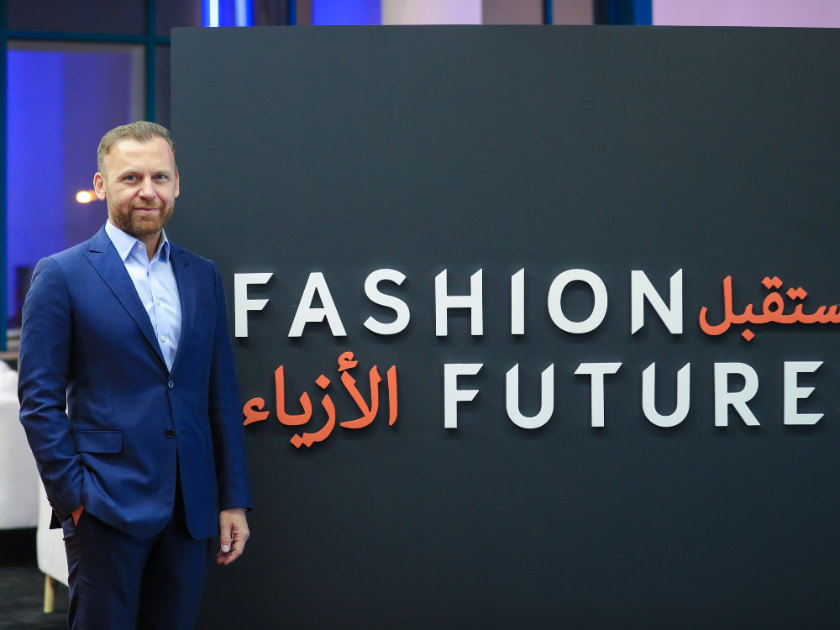
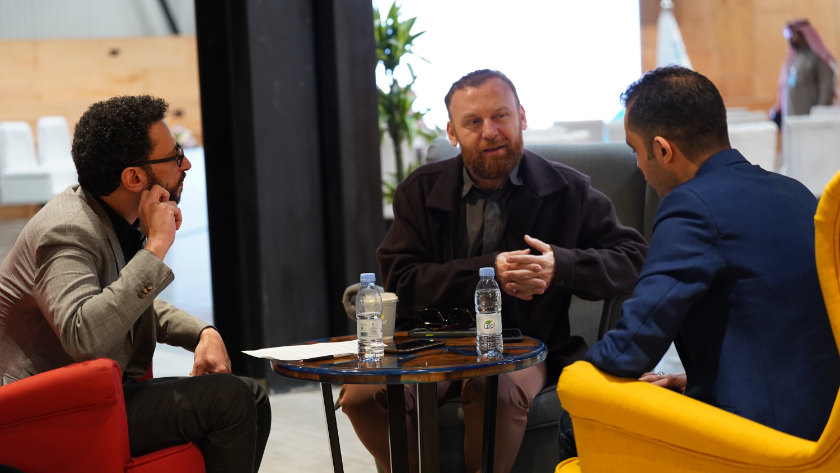
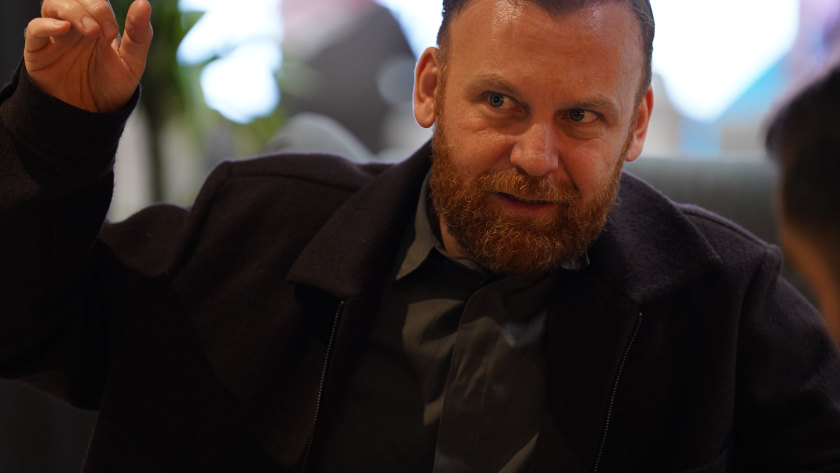
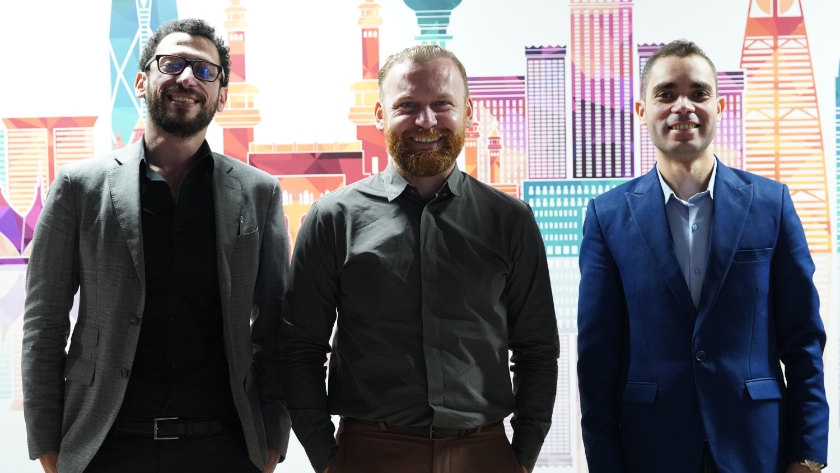
Fashion Commission CEO Burak Çakmak, as interviewed by the authors, who pose with him (above)
Saudi Arabia is the only place in the world where the fashion industry is being built from scratch, Burak Çakmak, the CEO of the Kingdom’s Fashion Commission, told Lucire KSA.
The commission has the full support from the leadership of the country. It’s evident because Saudi Arabia is the only place where the Ministry of Culture established commissions on all cultural sectors. This shows that they want to see these cultural sectors grow, they want to invest in it, and they want to build teams within the ministry to enable this.
Çakmak, who boasts 22 years in the fashion industry, told Lucire KSA that he is excited to see what he can do here in the Kingdom.
In 2021, Saudi Arabia announced the appointment of Çakmak as the CEO of the Fashion Commission.
How does the Fashion Commission plan to empower Saudi fashion designers and the fashion industry?
Well, it’s also a very exciting job because it’s amazing to find a moment anywhere in the world where you can actually build something from scratch. And you have the full support from the leadership of the country. It’s evident because Saudi Arabia is the only place where the Ministry of Culture established commissions on all cultural sectors. This shows that they want to see these cultural sectors grow, they want to invest in it, and they want to build teams within the ministry to enable this.
So obviously, fashion is one of the 11 segments. I come from a fashion background and I’m excited to see what we can do here. So, you know, I was surprised that we are looking at the full value chain and building every aspect of the value chain in the country. The beauty of where we are at this moment in Saudi is that number one is a very young population.
Everybody wants to be part of this new creative economy. But at the same time, unlike other places, Saudi didn’t have elements of the value chain in place. So the only thing that happened in a small way was retail. And it was definitely not at the scale of other neighbouring countries. But our opportunity with a young, large population and a population of 35 million is that we have a local economy that can support every aspect of the value chain in the country. This doesn’t have to be just a retail destination.
Since we have so many already well educated Saudis that are interested in building businesses, why don’t we enable them to build creative businesses?
I was very surprised to see how much interest was in building fashion brands in the country. When we initially started, we wanted to kickstart building our Saudi 100 brand programme, because this is one way to make sure that we have local brand presence. Because without a brand, the rest of the ecosystem doesn’t grow in the same way. You may have just retail or just manufacturing, but ultimately brand drives all aspects of the value chain. When you have local brands, they need the manufacturing, they need the textile access, they need logistics, they need retail, they need branding, they need shows, they need all the elements.
Hence we said, ‘OK, let’s make sure the first step is really pushing the brand journey.’
Can you tell us more about the Saudi 100 Brand Programme?
So the 100 Brands was an ambitious programme to see what exists. We didn’t even know how many brands were interested or existed in the country because we didn’t have the data on it.
In the first year, we had 1,300 applicants. Out of that, we were able to select 110 through a year-long journey. Once we realized who they are, what they are able to do across all product categories, we got even more ambitious. Even during that first year. We started with the programme in Riyadh, then we took brands from all over the country.
But then we initially didn’t start with international ambitions because we had to see where the brands were. We quickly realized that they were actually there and running businesses behind the scenes for a long time, they just were not enabled.
So this is not necessarily a student going into fashion business. It’s small businesses that existed without support.
They already know how to manage their customers, they can produce a small scale. We just had to bring that international language access to certain key knowledge players and spaces, and scale up.
As a result, we ended up with an exhibition in Riyadh. Then we took them to New York with the same exhibition and then we said, ‘OK, we can now finish with wholesale during Milan Fashion Week.’
Accordingly, in September we took the Saudi 100 Brands to Milan to do the first ever wholesale exhibition of Saudi brands. It’s educational for international buyers to understand, there’s fashion happening in Saudi because nobody has ever heard of it.
And at the same time, it’s a learning opportunity for brands. How does the international system work to say, this is how wholesale works, this is how you do your pricing line sheets, etc.?
So it’s an educational journey, but also the business journey we are taking, but also a cultural one to talk about what Saudi designers think about where their creativity comes from and how they reflect that to products for the local market, but also products for international markets.
The brand journey has been a very core part of what we do. But of course, beyond that, we need to invest in other aspects. So education has been another one we are doing in a more specialized way. We have started a lot of training programmes and this includes many aspects.
What did you focus on through the education programmes?
We looked at many aspects of education. What is the main need? So the first programme we launched was Fashion Futures, which is a B2B summit that happens in Riyadh. We’ve done it already three times this year and within that we started with master classes and workshops, but also bringing bigger names to talk about their personal journeys.
We realize there’s a huge demand with the technical workshops that’s going deeper into how to run a business, how to be creative, how to build your marketing strategy.
Thus, we’re bringing experts from all over the world to be able to take them through this journey. We also launched the certificate programmes with key partners. So we have run a programme with Institute Transfer remote from Paris on luxury management. We took 60 brands through this journey, partly in Riyadh and partly in Paris. We just graduated 60 brands in December in Paris. We did a beautiful reception at the Ritz and really gave them the journey of Paris and Riyadh and fashion, bringing that French savoir faire into the mix. We just launched a new programme for digital fashion with Istituto Marangoni from Milan.
This programme is about technical design training using digital tools. They’re learning how to use the software called Cloud 3D to be able to design only digitally, which you can then convert into a physical piece.
But these designs you can also use on metaverse social media gaming.
We are bringing the future thinking into the space, especially when you give the young talent the new digital tools, they will adapt quickly and they will be able to compete globally because this is a space where there’s not enough designers that are able to do digital design.
Thus, we want to bridge that gap quickly and make sure that Saudi Arabia is leading as a country in this space.
Beyond that, of course, we’ve done many master class workshops on things like sustainability, styling, merchandising with different academic partners, and we continue to look for international partners to be able to offer these on an ongoing basis. So we also have not just hard skills, but also soft skills that we are investing in. We launched a programme called Elevate.
Can you further elaborate on the commission’s efforts to empower women designers?
The programme is investing in the future female leaders in the fashion sector. Female industry players, middle management founders.
The idea is that we connect them with the top CEOs from around the world. It’s very much of a leadership mentorship.
They have monthly conversations around their future career, how they run their business, how to empower women to take leadership roles in the country. The reality is this is something needed in all countries.
And it’s so exciting to be able to lead compared to other countries to offer this opportunity, because one of the biggest challenges in Saudi is the access to talent. There are so many new opportunities. There’s not enough people. It’s a hot competition space and it’s a young population.
We need people with more experience. So we need to invest in them quickly so that they can grow into these positions. It’s a very different set-up than many other countries. In the west, most of the leaders are over 50 years old. They’ve been in their roles for a long time. Here we need leaders. There are enough young people, so we need to support them with all the key people from around the world that can bring their global knowledge to make sure that they are empowered.
They understand how the system works. They’re confident, and they’re able to also understand the leadership skills they need to do.
We have because we have amazing CEOs from all over the world, both male and female, that are supporting this programme. So, you know, these are very specialized programmes, but we know that year on year, it’s going to really make a difference in the Kingdom. We are investing every year, human capital first. So educational engagement, of course, will evolve into deeper programmes and potentially even degree programmes that will be offered in Saudi Arabia. The other thing we are doing in the Ministry of Culture is that we are going to be offering full scholarships to all design schools.
The Ministry of Education already provides scholarships to all degrees in the country, for Saudi citizens. But specifically the Ministry of Culture, we also made our shortlist of top academic institutions around the world. We will be offering starting this year, full scholarships to anybody accepted in the programmes, which is a game changer.
So, you know, we are already putting all the building blocks in a very strategic way that in a decade Saudi Arabia will be another place.
What other programmes and plans do you have in the pipeline?
The next step is, of course, making sure other elements of the value chain are addressed. For example, the first step we are doing is we are building a product development studio in Mohammed Bin Salman Nonprofit City. It’s called the City Hub. We actually lease half of this warehouse. Right now, it’s under construction. But this is going to be the first state-of-the-art production space for innovation in the fashion for ready to wear garments. We’re planning to buy the latest digital equipment, automated machinery, and bring the top technicians to be able to support any designer who comes with a sketch so they will get the full support from sketch to the finished sample. All in Riyadh, in one space.
Also this is very much starting with the educational and the support mindset. This is what differentiates from a designer going to any factory to do a sample where they’re charged too much money. They’re not always provided the latest innovation and they are not the priority because the factories are putting big brands as a priority. So the small brands never have access. So we are shifting this dynamic by making it the only place where start-ups have this level of access. So we will support all local brands who want to push their product limits.
continued below
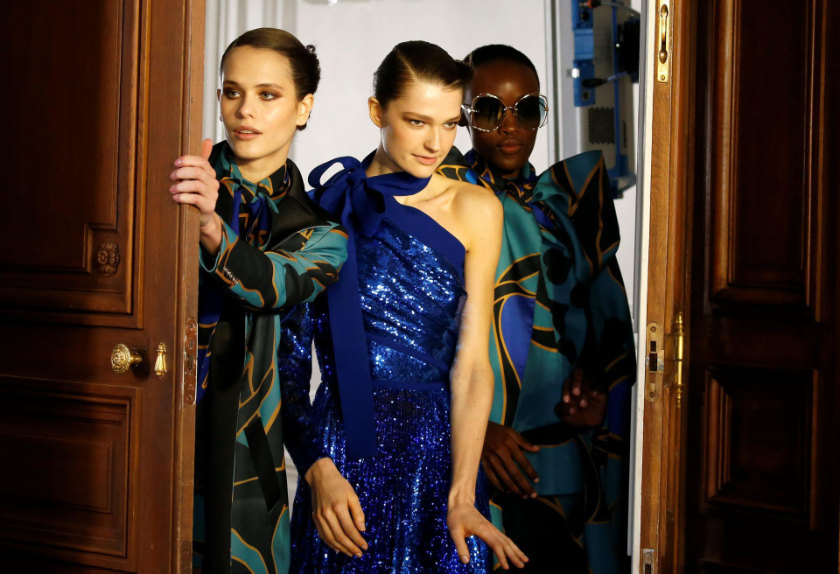
Is it some sort of a fashion start-up incubator?
For fashion brands and in a really tangible way. This will open the door for understanding what’s the need for local manufacturing.
Of course, this country is never going to be producing at the scale of China, Egypt, India, but like it happens in the west, in the US and UK, in France, in Italy, you always need specialized manufacturing.
So I believe that in the near term we will be able to demonstrate there’s a need for this kind of manufacturing to be built in the Kingdom. We will look at supporting them through joint ventures Investment Partnership, to offer these services to local events. So the minute we proved our local brands growing with their first customer in Saudi, then they also need the manufacturing, not just sampling and all the other elements which justifies investing in the space.
We are also looking at investing in a few other infrastructure projects we are going to be launching by the end of this year. Another space in the Jax Creative District. I don’t know if you heard of Jax. This is where the Biennale happens, which is next to Misk City. There are a lot of warehouses like this, so we are taking one of them to create another creative hub focused on supporting content creation. So photo shoots, video production, showrooms do more, the front end of the business. So we will be managing the hub through the commission supporting start-ups. They can produce products here, then they can do their photo shoots and showrooms events in that space.
We need to offer all services for the interest of the local population.
Beyond that, one of our most ambitious projects, which will take a longer time to build, but we already started working on it, is a research centre of excellence for materials.
The idea is that, you know, all aspects of the value chain, of course, including fabrics, materials that designers use.
Saudi Arabia is never going to be producing cotton like in Egypt. Yeah, but what can we do? We can actually invest in future materials. So we are in partnership with the King Abdullah University of Science and Technology. Which is an amazing research facility. So we are opening an office there and we will be investing in bringing international start-ups from anywhere in the world that supports research in innovation in the material space.
We will be looking at things like the recycled materials, materials out of agricultural waste materials produced in lab environments to say that these are the future areas where materials innovation is going to happen and.
We are basically not in deficit across any country because nobody has really invested in this. So this is a space we can lead and we are willing to invest in it to scale them, even support them in building manufacturing and production units for the materials and be a supplier not only for local brands but for the rest of the world. So this is a longer-term journey.
Basically, we looked at every aspect and what we can do relevant to Saudi and relevant to what resources we have. So we are addressing materials manufacturing, brand building, and then of course, we have retail, which is the easier one. Retail is booming in the country. Every brand is coming, but also many of the big operators of the malls are opening new spaces.
Can you tell us about your partnerships with local entities?
For example, we created the dress code for the Saudi Cup, which is the biggest horse race in the world in terms of value.
Two years ago we launched the dress code for it, inspired by the traditions of all the regions. And since last year, what we are doing is not just the guests attending and following a dress code. It is very much about the Saudi heritage and tradition. And what’s been amazing is last year we actually had a full on exhibition in Saudi Cup showcasing traditional garments designed by contemporary designers. But also we partnered with celebrities and local designers to dress them and created the photo booths, full-experience videos.
So it became an element of culture and entertainment during the Saudi Cup. You go to the horse race, you’re engaging and watching that, but you’re also in this amazing space where everybody is celebrating how they dress, talking about the garments, their history, visiting an exhibition.
So we did our first partnership with the Red Sea International Film Festival. So we were able to actually create a styling suite and then invite all of the people that are attending to come and dress. We had amazing interest from Elle Macpherson to many, many others that we can share names that ended up wearing from Saudi brands. We aimed to show that actually Saudi design is very diverse. It’s not just abaya that people think is the only product created here.
In Saudi Arabia, every region has its own twist. it’s not just traditional, it’s also modern and it’s infused. And it’s and it’s very different from other countries even in GCC, there are differences. In the Arab world, it’s totally different. This is very different from Egypt, very different from Lebanon, very different from even Dubai. So we want to build an understanding of what Saudi fashion is.
What other activities do you plan to do?
So going forward, of course, now we are creating these key moments. We clearly will always continue with the Saudi Cup and in the fall we will always do our Fashion Futures event and we are making it more and more engaging with the public. So a big element is the training master classes workshop. But then we also did pop-up spaces to exhibit the work of the designers. So we are very much interested in giving visibility to designers and to the public fashion enthusiasts. So it’s creating a fashion moment that’s beyond just training. We plan to do more exhibitions this year, both locally and internationally. We will be taking brands again abroad to fashion weeks. We will announce the exact dates and where we are going to be, but we are already planning for the rest of the year. It’s not finalized, but I think the important thing is to say that definitely in Europe we will have a presence. We will have a major presence in one of the fashion weeks this year.
Will we see fashion shows in Saudi Arabia?
There is definitely an interest. So we are doing our assessment when to do it. I think what I want to say is we are trying to figure out when is the right time to do it. I’m confident that it needs to happen. Yes, I can say that the interest is there. We will find the right time in the calendar to start it in the right way.
The key message is that Saudi fashion is used. Saudi brands are now getting visibility both locally and internationally. They’re there on the red carpet. They are doing activations abroad.
We even have brands like, for example, Ashi Studio, the Saudi designer doing couture shows in Paris. We want to celebrate all these moments that are happening internationally. We want to do more in the country. So all of this will be happening clearly in the next 24 months.
In the next two years, most of these things will be in place in the country. Definitely our key making spaces will be in place. The activations will grow, will be bigger, we will be more public facing. There will be retail, there will be some kind of experience, show experience.
What is the current volume of investments in the Saudi fashion industry?
Our biggest challenge, I’ll tell you, is that there’s no data about the sector. We are actually building a data hub. We will be doing our first state of the fashion report for Saudi based on the data collected in May.
So this will be the first time you’re going to be publishing all the data we are collecting from government entities, private sector to talk about the size of industry, how many people are working in it? A number of brands that are here, what kind of product sells, what are consumers interested in? We are in the middle of that journey right now.
This is also a game-changer because even the industry players were asking us, you know, how do I benchmark myself? Right? There’s no information there. So this will be a door-opener for attracting investment engagement, but also for us to be able to show our impact in the country.
And we will also do a strategy road show, taking our plans to different parts of the world, showcasing local brands and retailers, but also talking about the opportunities for investment in the country. So the data report that we published will really support this journey as well. So these will be key business moments after the launch in May immediately for the rest of the year. We will do it in summer and in the fall we will be going to the US and Europe.
There are opportunities to invest in every aspect of the value chain. What we do is to demonstrate the business case to the rest of the world.
As a commission, we are a regulator and an enabler. So one of the roles we are doing is, of course, how do we make it easier to do business? So we are looking at every aspect of the regulation and we have already identified certain priorities that we will start tackling in the next 12 months.
For example, we’ll be the licensing body for all fashion-related things in the country. That’s an easy thing, of course, but at least it gives us the visibility of what’s happening. But beyond that, we are looking at everything from import exports, labour laws, education, and we will work across all ministries to make it easier to engage. We are in conversations with the Ministry of Investment as well.
We are looking at, for example, what are the existing incentives to attract businesses here, to build businesses. And we will take this as part of the engagement as we do around the world. I think what’s going to happen is, number one, the data reports will give us some insights. Number two, for example, the product development studio we built is going to give us insights into what product categories there is demand in the in the country, what volume, what are local brands producing, what price point they need to ingest, which will allow us to easily build a business case to factories around the world or local investors to say, Listen, we know that if we build a, let’s say, a jersey factory or a soap factory or a mill, for sure there will be high demand.
What’s the most fascinating fact that you discovered about the Saudi fashion ecosystem?
What has been quite interesting actually, is when we did the Saudi 100 Brands programme, a majority of the applicants were female and they are founders of the business. They’re the creative directors of the business. Nowhere in the world you see as many female led fashion brands.
In Saudi Arabia about 85 per cent of the brands that we work with are female owned and led and which is very unusual for this global fashion sector. Europe and others, they are basically trying to increase female creative directors, female owners. That gives us a beautiful opportunity to say that, you know, this is an attractive business for women leaders and also it teaches them how to do business. Where else in the world do you have as many female leading businesses in a sector like this? So we love being able to take them at Milan Fashion Week. It was amazing to see all the international fashion industry come and meet all of these founders. And it was interesting to see them saying, are you Saudi? I’m like, ‘Yes, everybody is Saudi.’
What’s the top challenge facing the industry here?
The main challenge is always having access to a value chain in an easy way to be able to produce quality at the right price. And then, of course, having access to consumers in a very crowded market, especially for large brands, they invest heavily on marketing communication. So it becomes very difficult.
The beauty of what we are able to do and that’s what makes Fashion Commission unique, is that as a Ministry of Culture and government entity, we are able to really support and give visibility to brands in a way that in other countries, local brands do not get.
Where else have you seen 100 brands taken by a country to a whole trade show to showcase their business with full annual mentorship or weekly engagement?
You know, it’s a very comprehensive programme we’re running, and that’s this scale is so hard to do unless it comes from the government side.
Then on the consumer end, of course, I’ll talk both locally but also globally. Locally. I think we are here to even educate Saudis on who the Saudi designers are, and what they produce, because there was no promotion of this kind of product in the past. So people don’t know. If you ask on the street how many Saudi brands you can list, it’s very few, Very few. The other part is, of course, most of them didn’t have a physical store, so it’s not easy. So we are trying to build that ecosystem even in the country so that we raise awareness and support local.
At the same time, internationally, I think overall, beyond the Saudi context from a consumer perspective, of course, huge focus on sustainability and it’s very much linked to the agenda of all of the governments to create a more sustainable future for all sectors. •
Related articles hand-picked by our editors
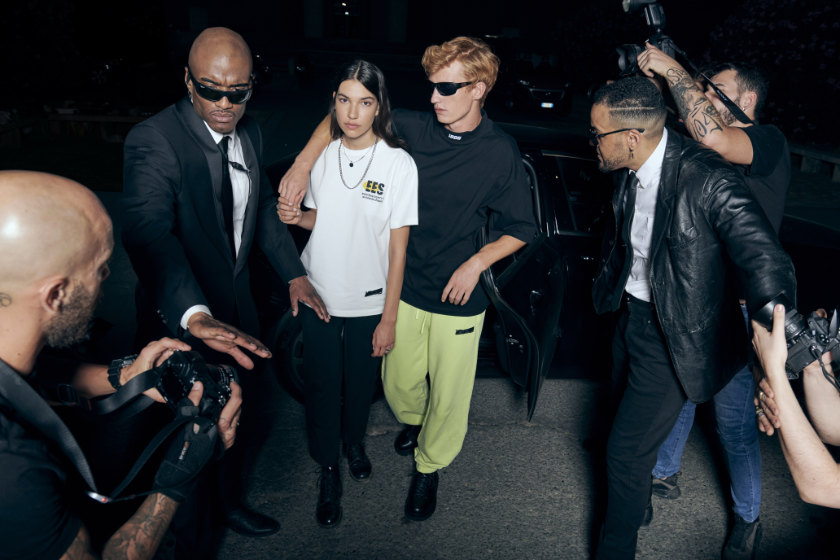
Unity without judgement
L’unité sans jugement
Saudi brand 1886 has an empowering message of self-expression without judgement—all while making high-quality streetwear that stands the test of time. Jack Yan talks to founders Fahad Al Jomaiah and Khalid Al Jammaz
La marque saoudienne 1886 transmet un message d’émancipation qui consiste à s’exprimer sans jugement – tout en fabriquant des streetwear de haute qualité qui résistent à l’épreuve du temps. Jack Yan s’entretient avec les fondateurs Fahad Al Jomaiah et Khalid Al Jammaz
First published in the November 2022 issue of Lucire KSA
Dans le numéro du novembre 2022 de Lucire KSA
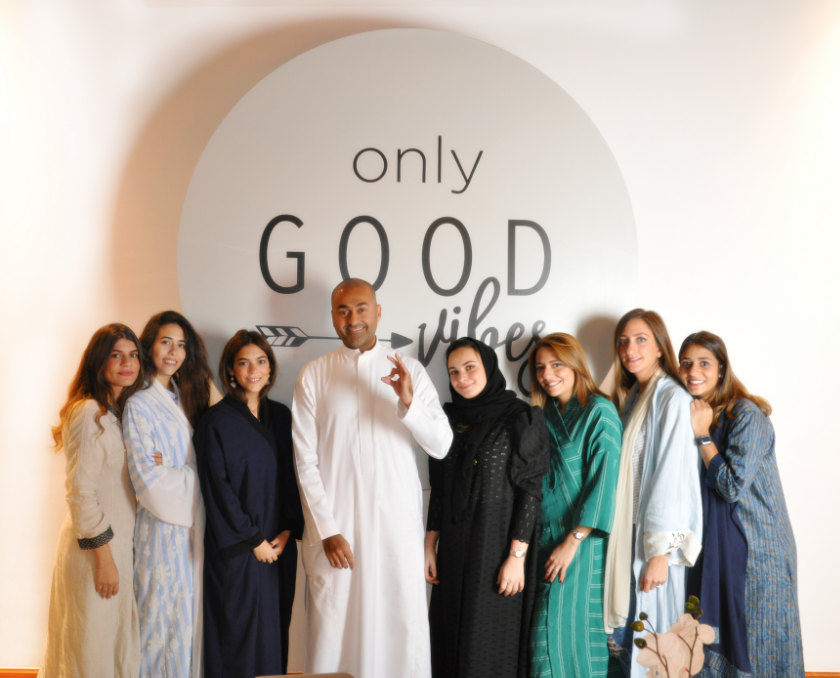
The king of Saudi fashion retail
At the forefront of Saudi Arabia’s fashion retail industry are two brands—Femi9 and Vivid Flair—which are both owned by Fad International. Qurratulain Wahab met up with the company’s founder, Eyad Mashat, to find out more
From the January 2019 issue of Lucire KSA
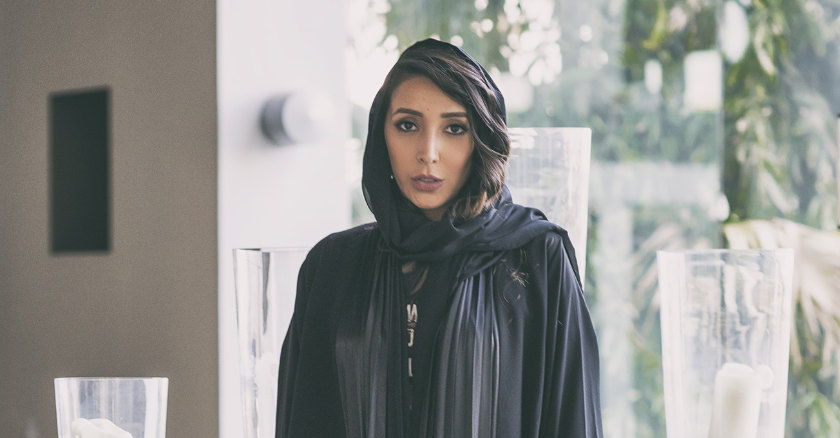
Getting serious about Saudi fashion
Marriam Mossalli is the founder of Niche Arabia, one of the Middle East’s leading consultancies specializing in fashion and luxury goods. She is a leading voice for Saudi Arabia’s emergent fashion industry. Qurratulain Wahab headed to her offices in Jeddah to find out more
Photographed by Nouf Alhimiary and Lina Qummosani
From the December 2018 issue of Lucire KSA